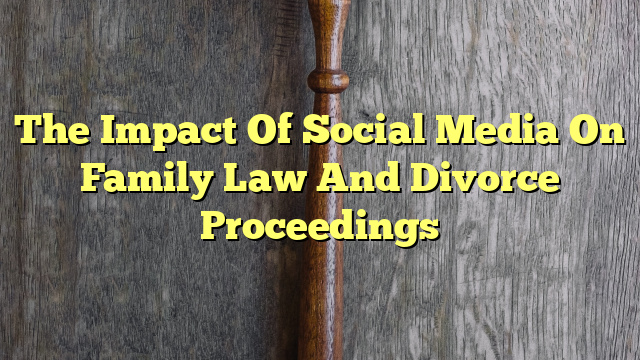Table of Contents
- How does social media affect divorce?
- Can social media be used as evidence in divorce court?
- Should I delete social media when going through a divorce?
- How is social media responsible for family disputes?
How does social media affect divorce?
In today’s digital age, social media has become an integral part of our lives. With the majority of adults having at least one social media account, it has become an important platform for communication, sharing news, and even for conducting business. With these changes, the impact of social media on family law and divorce proceedings has been growing.
Social media can have a significant impact on divorce proceedings in a variety of ways. For example, photos or posts on social media platforms can be used as evidence in court. If one spouse posts disparaging information about the other or posts photos of them engaging in activities that could be seen as inappropriate, this can be used against them in court. In addition, divorce proceedings can be delayed if one spouse fails to provide access to their social media accounts or fails to provide all the information requested.
Social media can also play a role in settling divorce disputes. In some cases, both spouses may agree to put their differences aside and use social media as a platform to communicate and come to an agreement. This can be a more efficient way of settling disputes than going through the court process.
Social media can also be used to keep track of one spouse’s activities. For example, if one spouse is suspected of hiding assets or engaging in activities that could hurt their case, their social media accounts can be monitored and the information gathered can be used as evidence in court.
Can social media be used as evidence in divorce court?
Yes, social media can be used as evidence in divorce court. Posts, photos, and videos on social media can be used to support or refute a spouse’s claims during the divorce proceedings. This can include posts or photos that show a spouse engaging in activities that are inappropriate or posts that could be seen as disparaging towards the other spouse.
In addition, social media accounts can be monitored to determine if one spouse is hiding assets or engaging in activities that could hurt their case. For example, if one spouse is suspected of hiding assets, the other spouse can monitor their social media accounts to see if they are making purchases or engaging in activities that could indicate the presence of hidden assets.
Should I delete social media when going through a divorce?
It is not necessary to delete social media accounts when going through a divorce, but doing so is not advised. Deleting social media accounts can be seen as an attempt to hide information or activity that could be used as evidence in court. While it is important to be mindful of what is posted on social media and to be aware that posts can be used as evidence, deleting social media accounts is not the best way to protect oneself in a divorce.
That said, it is important to be aware that social media posts can be used as evidence and to be mindful of what is posted. It is also important to note that posts can be misconstrued or taken out of context, so it is important to be careful about what is posted. In addition, it is important to be honest when providing access to social media accounts during the discovery process.
How is social media responsible for family disputes?
Social media can be responsible for family disputes in a variety of ways. For example, posts or photos that are seen as disparaging or inappropriate can lead to disputes between family members. In addition, social media


Clearly, social media has had a discernible impact on family law and divorce proceedings. From opening the door of communication to creating digital footprints, it’s essential to be aware of the potential negative implications of social media.